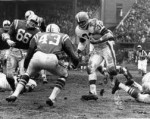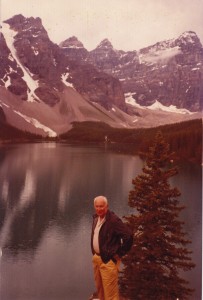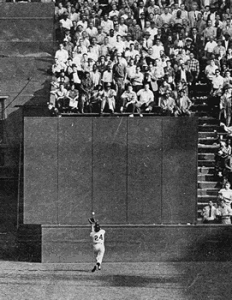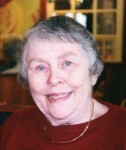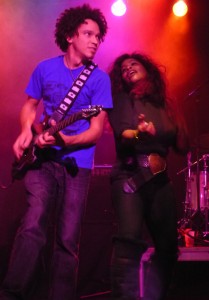Alexandra Styron’s Father’s Day Reflections
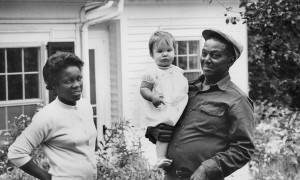 Because I was in Toronto over Father’s Day, I was late in catching up to Alexandra Styron’s New York Times essay, Missing: My Dad, published on Sunday, June 16. The colon in the title carries the rueful message of the whole piece.
Because I was in Toronto over Father’s Day, I was late in catching up to Alexandra Styron’s New York Times essay, Missing: My Dad, published on Sunday, June 16. The colon in the title carries the rueful message of the whole piece.
Last year Alexandra published Reading My Father: A Memoir, a candid and insightful book that I read, marveling at her revealing, pithy, chronicle of her difficult father, William Styron. In the recent piece she again probes the painful subject of what she calls her father’s “grumpy and distant” temperament. The starting point for the column was her discovery of a photograph while researching the memoir, a black & white image by well-known photographer Bernard Gotfryd that finds her at about two years of age in the arms of James Terry, aka “Terry,” She describes him as “a man who performed many jobs around our place but none more important, or better executed, than filling the aching void left by our father’s inaccessibility.”
She reflects on many ironies, not least that her surrogate parent Terry, an “illiterate son of sharecroppers” filled the breach left by her emotionally unavailable father, who saw himself–and was–consumed with the creation of his art. She observes that that work included his Pulitzer Prize-winning depiction of the rebel slave Nat Turner, published even as Terry and his wife Ettie, African-Americans themselves, shouldered a key role in raising the four Styron children.
We know from Darkness Visible, her father’s 1990 cri-de-coeur, and Alexandra’s book, that in the decades after the period of the photograph he suffered debilitating mental illness and later dementia, which often rendered him unable to write, and even more difficult as a parent than in earlier years. It so happens that from 1997-99 I had my own encounter with Styron, when I prevailed on him to write an Introduction for a book I had acquired and edited for publication, Dead Run, a nonfiction chronicle of an innocent man on Virginia’s Death Row, the state where Styron was born. That encounter led to a personal essay of mine, “William Styron: A Promise Kept,” linked here on this blog, that was published in the BN Review a few months after I read Reading My Father. As I wrote in my piece, I never saw the difficult side of William Styron: “Though I know from reading Alexandra Styron’s book that her father was prone to explosions of temper, despite my months of cajoling he never lost patience with me. I imagine such a dynamic is not unknown among the children of difficult parents—polite to strangers, abrupt or worse with family members.”
It is impossible to read Alexandra’s book, or her latest essay, without feeling the painful imprint that her father’s difficult personality made on her. She adds too, that her “Southern father had taken a notorious bruising from many black intellectuals for assuming the voice of Nat Turner, an African-American icon, in what he called a ‘meditation on race.’” In fact, Confessions was dedicated to Terry. Even as a youngster, Alexandra writes, “None of this is to say we were deaf to the echoes our relationship with Terry evoked. On the contrary, before I knew much of anything at all, I was aware that a little white girl being squired around by an elderly black man in a mechanic’s uniform created something of a spectacle.”
The essay ends on a surprising and poignant note. After Alexandra published her memoir she heard from a man she’d never met, Joe Quammie. Like the Styron kids, he’d grown up in Connecticut. In some ways his experience was similar to hers, as he wrote, “my father didn’t have much to do with us kids,” though in other respects they differed. African-American like Terry, the older man had been his Boy Scout troop leader and a father figure to him. At times, he wrote Alexandra, he’d resented all the time Terry spent with her family, and the “fond way he spoke” about them. He said he ultimately came to see his feeling as a case of “simple sibling rivalry,” though she doesn’t believe it was “simple” at all. He also informed her of a sad symmetry with her father–Terry had also endured dementia before his death.
Joe’s outreach to Alexandra has initiated a new friendship, a quasi-sibling relationship they’re both nourished by. She reports that in April Joe wrote her he’d been back in New Milford from his home in Toronto, Canada. “He’d been to Ettie and Terry’s grave site, and planted some perennials, ‘one for each of us kids.’ I’m hoping to get up there to see his handiwork, before the turn of another year.”
I urge you to read Alexandra’s whole essay, as there is much more to it than I have touched on here. Finally, despite William Styron’s failings as a father, painfully portrayed in her essay and memoir, I will continue reading and relishing his work–from Set This House on Fire through Lie Down in Darkness, Confessions of Nat Turner, Sophie’s Choice, and all his other work, including the articulate argument against the death penalty that he marshaled in his Introduction to Dead Run. His contribution to American letters is undiminished.

